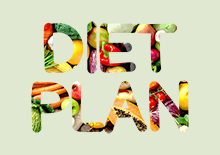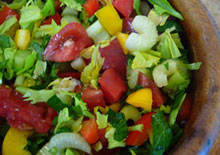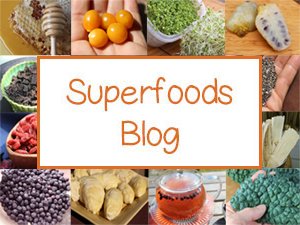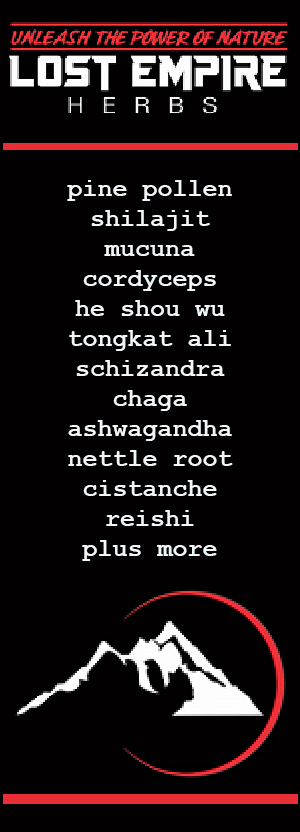- Home
- Types of Diets
Types of Diets, Our Top Favorites
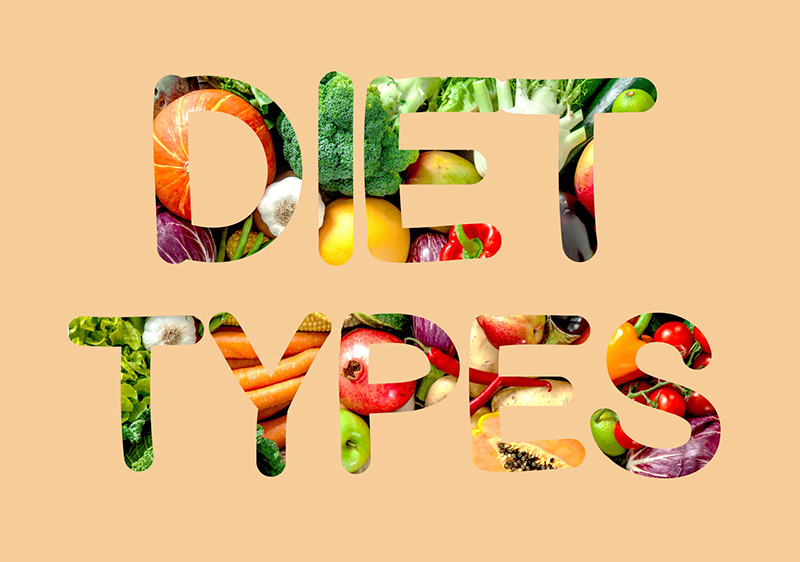
There are many types of diets to select from according to one's health goals and nutritional needs. From our perspective, there is really no "one size fits all" approach to dietary practices.
When it comes to maintaining healthy eating habits, the foods you choose to eat and drink might vary from day to day depending on the following factors.
Factors Affecting Dietary Choices
Table of Contents
Intro | Factors Affecting Dietary Choices | Our Top Favorite Types of Diets | Precautions
- Seasonal Climate and Environment - Different foods and drinks consumed are often relevant to environmental surroundings and weather conditions. For example, winter is often a time to eat hot, heavier, building foods, whereas a summertime menu might include more cooling raw fruits and vegetables.
- Different Body Types - One's diet can also depend on the specific and unique body constitution of the individual, referred to as the "doshas" in Ayurveda.
- Acute or Chronic Health Issues - This is probably one of the most common reasons why making a diet change could be of benefit.
- Age and Genetics - Different diets and specific foods and nutrients might be more appropriate depending on one's age and other genetic factors.
- Amount of Physical Activity and Exercise - The types and amounts of foods you choose to consume daily are largely contingent on how much physical movement is achieved throughout the day.
Below is a list of our favorite types of diets to consider depending on your current health objectives. They are not listed in order of importance.
Our Top Favorite Types of Diets
(Use the links below to jump to desired section.)
1) Whole Foods Diet
2) Mediterranean Diet
3) Vegan and Vegetarian Diets
4) Ketogenic Diet
5) Paleo Diet
6) Intermittent Fasting
7) Detox Diets
8) Gluten-Free Diet
9) Body Ecology Diet
1) Whole Foods Diet
A whole foods diet doesn't follow a specific food plan but is centered on foods that are closest to their natural state. This diet is basically considered "clean eating" and excludes processed or prepackaged foods that contain artificial flavorings, preservatives, additives, trans fats or refined ingredients.
Whole foods are minimally processed and made directly from their source, primarily grains, legumes, vegetables, fruits, meat, fish, poultry, eggs and dairy products. Meals made with whole foods are considered to be less addictive than processed or manufactured food products. Eating a whole foods diet is also known to provide more nutrients and fiber.
2) Mediterranean Diet
This diet dates back thousands of years and was developed over time
through a melting pot of shared Mediterranean customs and food
traditions especially locations around southern Italy, Greece, Turkey
and Spain. The term Mediterranean diet is really in fact a misnomer as
it implies that all people of the Mediterranean region eat the same
which is simply not the case.
Generally, however, there are
similar food, drink and diet patterns between the cultures of this
environment. The popular version known today typically includes a
high-fiber diet of fruits and vegetables, potatoes, grains, legumes,
olives, aromatic herbs, nut and seeds, whole grain bread and pasta, extra virgin olive oil and
moderate amounts of dairy, poultry, fish or seafood. A glass of red
wine may often accompany a meal but red meat is less frequently on the menu.
In some research, the Mediterranean Diet was correlated with a reduced risk of cardiovascular health issues.
3) Vegan and Vegetarian Diets
The vegan diet primarily encompasses plant-based foods and the
exclusion of seafood and animal-derived protein and dairy sources either
for ethical, ecological, religious or health reasons. To compensate for a lack of
animal foods, it is recommended that strict vegans incorporate more
plant-based protein sources as well as vitamin B-12 supplements into
their diets.
A popular branch of the vegan diet in the 1990s
became known as the raw vegan diet. This was comprised of eating vegetables, fruits, fats, nuts and seeds that have not been cooked over
115–118° F (45-48°C). This is to ensure that the food retains its
natural living enzymes and nutrient content which is typically destroyed
by heat or cooking methods. Because of these qualities, raw
vegan plant foods are believed to be easier to digest and nutritional
utilize.
Vegetarian diets include vegan foods but can sometimes contain varying amounts of eggs and dairy. Vegetarian who eat seafood are often called "pescatarians.". The healthiest vegan and vegetarian diets are those that are sourced from whole foods not processed and pre-packaged products.
4) Ketogenic Diet
The ketogenic or "keto" diet is a low-carb protocol that changes the body's source of fuel from burning sugars (glucose) to burning mostly dietary fats for energy as well as small amounts of protein. The diet, therefore, is highly centered around consuming high-fat foods, usually healthy fats like avocado, coconut oil, fish like wild-caught salmon, eggs, and a very limited amount of fruit, grains, starchy vegetables, sugar or alcohol.
There are several modifications of the keto diet but the original version included 75% of calories from FAT, 20% of calories from PROTEIN, and 5% of calories from CARBOHYDRATES.
The basic idea of the keto diet is to achieve a state of "ketosis" in which the body burns fat rather than sugar. Ketosis also coincides with a rise of ketones in the blood which can be monitored with special testing strips for accuracy.
Ketogenic diets are viewed as ideal for those looking to reduce excess body fat. After ketosis is reached, consistent and rapid weight loss can begin to occur until healthy body weight is achieved.
5) Paleo Diet
The paleo diet, or sometimes called the "primal diet", largely consists of foods that closely replicate those consumed by our primitive hunter-gatherer ancestors during the Paleolithic era. This diet excludes processed foods, grains, legumes, dairy products, refined sugar. Sometimes salt, alcohol and coffee are also omitted or limited on this diet.
The bulk of the paleo diet is whole food-based and comprised of grass-fed meat, poultry, seafood, eggs, vegetables, nuts, seeds, unrefined oils, certain root tubers like sweet potatoes, fruits (especially berries) and small amounts of honey. There is typically an emphasis on consuming a large portion of red meat, especially wild game varieties.
Sometimes those adhering to a paleo diet long-term may need to supplement with vitamin D and calcium.
6) Intermittent Fasting
Intermittent fasting is commonly considered a weight-loss tool simply because it can help some people reduce unwanted pounds. This method however can also be very helpful for normalizing healthy digestive functions. It not only gives the body time to catch up and break down potential undigested waste material but according to some experts, this type of diet reduces insulin levels during the fast which may also help to burn fat.
The basic concept is to fast for an extended period until your next meal. This fast/eat time frame can vary.
Popular Intermittent Fasting Schedules Include:
- A 24-hour fast once or twice a week.
- A 16/8 method, fasting every day for 14-16 hours (includes sleep time) and eating two meals during an 8-10 hour period.
- Alternate-day fasting means you fast every other day.
The term "fasting" in this case essentially means NOT eating solid foods or drinks BUT you can consume water, coffee, tea or zero-calorie beverages. When it comes to mealtimes, it is best to eat high-quality healthy whole food meals and avoid over-eating.
7) Detox Diets
There are many types of detox diets. They all involve the process of eliminating or "detoxifying" potential toxins from the body and bloodstream. They are mostly short-term regimens that can offer cleansing effects primarily targeting the liver and colon.
These types of diets range depending on the overall health of the individual and their current dietary practices. For example, someone eating a standard American diet with occasional fast-food indulgences might have a cleansing reaction to eating a whole food diet, SOS-free diet (no salt, oil or sugar) or raw food diet. Others may benefit more from fasting protocols like the Master Cleanse, juice fasting or even medically supervised water fasting.
Detox supplements and herbs, like laxatives, are commonly incorporated into many daily regimens to encourage the release of accumulated toxic waste material.
8) Gluten-Free Diet
Gluten-free diets are of course very appropriate for those with celiac disease caused by a reaction to gluten-containing foods such as wheat, barley or rye. Some people may not have major health disorders from consuming gluten but find they simply feel less fatigued with better digestion when maintaining a gluten-free diet.
Gluten-free options are widely available in modern times. Bread and baked goods can often be made with other types of gluten-free grains such as quinoa, amaranth, buckwheat, sorghum, millet and teff. For more nutrition data on these varieties visit our page on Nutritional Comparison of Gluten-Free Ancient Grains.
9) Body Ecology Diet
The Body Ecology Diet is a type of diet introduced in the mid-1990s by author Donna Gates to assist those with varying degrees of candida overgrowth. This is when Candida albicans significantly outnumbers other microflora in the gut microbiome. When it becomes the dominant species, it can cause a condition known as candida, candidiasis or candidosis. Over time a systemic yeast/fungal infection can cause indigestion of food and the toxic leaking of this undigested waste material into the bloodstream.
The Body Ecology Diet focuses on a low-sugar diet and foods and beverages that help to cleanse the body, replenish friendly bacteria in the GI tract, build alkaline blood and boost immune functions. In the U.S., The Body Ecology Diet was the first to introduce consuming sweeteners like stevia, fermented foods like kefir and sauerkraut and grains like millet and quinoa to the American public.
Precautions:
We advocate seeking the advice of your physician or health professional before undertaking any new types of diet regimens or self-treatment protocols. This is especially the case if you are pregnant, nursing, taking prescribed medications or have a serious medical condition.
